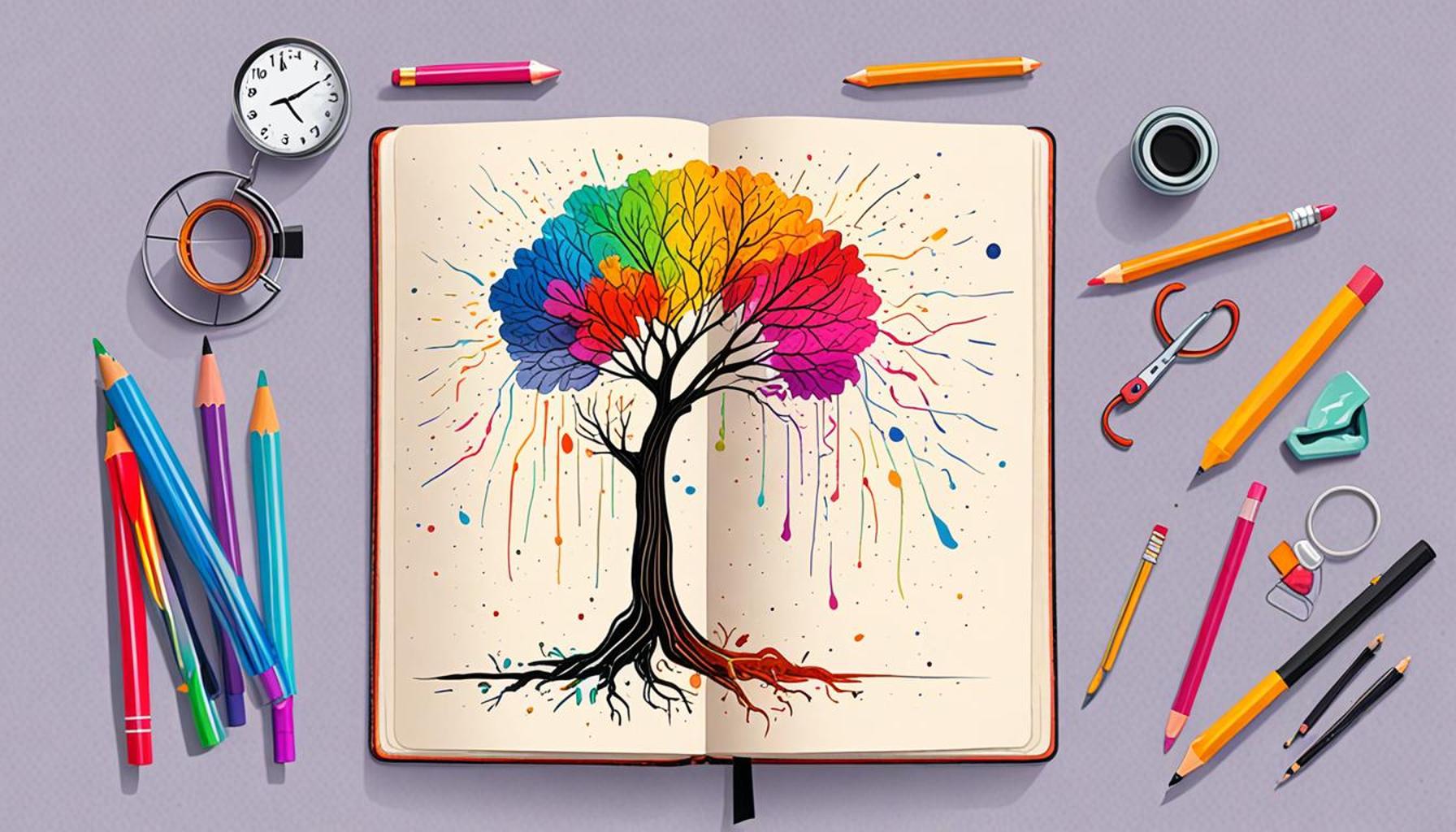The Impact of Reflective Journaling on Building Positive and Collaborative Relationships

Understanding Reflective Journaling
The practice of reflective journaling serves as a powerful tool for introspection, encouraging individuals to engage in a structured assessment of their experiences. This method is not just a mundane exercise; it creates space for personal growth by facilitating a critical examination of thoughts and feelings. By jotting down experiences, individuals gain clarity about their emotional responses, decisions, and interactions, allowing for a richer understanding of both self and others.
Benefits of Reflective Journaling
Reflective journaling presents a myriad of benefits that can transform one’s approach to various aspects of life.
- Enhances self-awareness: Through thoughtful writing, individuals can identify emotional triggers and patterns in behavior. For example, a teacher in Nigeria might record their feelings after a challenging classroom interaction, leading to insights about their teaching style and areas for improvement.
- Improves communication skills: By putting thoughts into words, reflective journaling aids in articulating complex emotions and ideas clearly. This can be particularly beneficial in Nigerian workplaces where effective communication is vital across diverse teams.
- Fosters empathy: Engaging with one’s own reflections can lead to a deeper understanding of the viewpoints of others. For instance, sharing reflections among colleagues during team-building exercises can highlight different cultural perspectives, promoting an inclusive work environment.
Reflective Journaling in Nigeria
In a nation as culturally rich and diverse as Nigeria, the implications of reflective journaling are profound. The practice can be particularly useful in navigating complex social dynamics that arise from the interplay of various ethnic backgrounds and belief systems. Reflective journaling can enable individuals to:
- Bridge cultural gaps in teamwork: By encouraging team members to express their individual experiences, reflective journaling can create a shared understanding that allows for more effective collaboration.
- Resolve conflicts with a clearer understanding: When disagreements arise, journaling about the situation helps to analyze emotions and responses, leading to constructive dialogue.
- Strengthen community ties through shared reflections: In local communities, organizing reflective writing workshops can foster connection and collective healing, especially in regions recovering from social unrest.
As we engage with the concept of reflective journaling, it is clear that its impact transcends mere self-improvement. It lays a strong foundation for cultivating positive and collaborative relationships. Across various spheres of life—be it in education, the workplace, or community gatherings—reflective journaling can be the key to harmonizing interactions and promoting understanding among people of different backgrounds. Through this transformative practice, individuals can not only grow personally but also contribute to a more empathetic and cohesive society in Nigeria.
CHECK OUT: Click here to explore more

The Role of Reflective Journaling in Relationship Building
Reflective journaling emerges as a significant catalyst in the development of positive and collaborative relationships. By enabling individuals to process their feelings and thoughts, this practice fosters an environment where empathy, understanding, and cooperation can thrive. For example, in the context of Nigerian educational settings, students who regularly engage in reflective journaling often find themselves better equipped to collaborate with peers. The act of reflecting not only helps them articulate their thoughts but also nurtures a sense of shared responsibility and respect among classmates.
Creating a Space for Open Dialogue
At its core, reflective journaling encourages open dialogue and transparent communication, which are essential for any successful relationship. This practice can be particularly relevant in Nigeria’s workplace, where teams often comprise members from diverse backgrounds. By taking the time to write about their experiences and perceptions, teammates can share insights that might otherwise go unspoken. Journaling thus becomes a medium through which individuals can express their unique perspectives while fostering a culture of inclusivity and respect.
Key Components of Reflective Journaling
To maximize the benefits of reflective journaling in building relationships, several key components should be considered:
- Regularity: Consistency is paramount. Just as one might maintain a fitness routine, making time to journal regularly can significantly enhance self-awareness and interpersonal skills.
- Honesty: Authentic reflections require individuals to be honest with themselves. This honesty not only leads to personal growth but also inspires trust in relationships, as others see the sincerity in one’s self-expressions.
- Feedback Integration: Incorporating feedback from peers or mentors into one’s journaling practice can enrich the reflective process. It allows individuals to consider alternative viewpoints and adjust their relationships accordingly.
- Goal Setting: Journaling can be used to set relationship goals, such as improving communication skills or addressing conflicts. Thoughtfully outlining specific objectives can guide the individual’s interactions with others.
The convergence of these components results in a practice that not only enhances individual growth but also nurtures the collective dynamic within groups. By utilizing reflective journaling as a tool for personal and interpersonal development, individuals in Nigeria can pave the way for more harmonious collaborations and enrich relationships across various contexts, from educational institutions to corporate environments.
Fostering Trust and Understanding
As individuals embark on their reflective journaling journey, they often find that trust begins to blossom in their relationships. The practice of documenting feelings and experiences promotes authenticity, allowing individuals to connect with others on a more profound level. Moreover, in a culturally diverse nation like Nigeria, where misunderstandings can easily arise from differences in cultural practices, reflective journaling acts as a bridge. By understanding one’s own reactions and the possible motivations behind others’ behaviors, individuals can cultivate a deeper sense of understanding, thereby enhancing their collaborative efforts.
| Category | Details |
|---|---|
| Improved Communication | Reflective journaling enables individuals to articulate their thoughts clearly, fostering better dialogue and understanding among peers. |
| Enhanced Empathy | By reflecting on their experiences and emotions, individuals develop a stronger ability to empathize with others, crucial for collaboration. |
Reflective journaling serves as a powerful tool for enhancing interpersonal skills, leading to positive changes in collaboration. The act of writing down experiences encourages introspection, allowing individuals to process emotions and interactions from a deeper perspective. For example, when team members regularly engage in reflective practices, they are more likely to recognize and appreciate differing viewpoints, which builds a healthy atmosphere for constructive dialogue.Moreover, the therapeutic aspect of journaling cannot be overstated; it offers individuals a safe space to explore their feelings about relationships and collaborations. This practice not only helps to clarify personal motivations but also enhances problem-solving abilities within a group setting. As members share their reflective insights, teams can break down barriers, leading to a more cohesive and cooperative work environment.Furthermore, research indicates that organizations that encourage reflective journaling notice significant improvements in employee satisfaction and retention. This is largely due to the deepened mutual respect and understanding cultivated through shared reflections. Such findings highlight the impact of journaling in creating a culture of collaboration, where relationships thrive on clarity and trust. In essence, the focus on reflective journaling can fundamentally transform how individuals interact, paving the way for stronger, more resilient relationships that are essential for successful collaboration.
LEARN MORE: This related article may interest you
Enhancing Emotional Intelligence Through Reflective Journaling
Another profound aspect of reflective journaling is its remarkable ability to enhance emotional intelligence among individuals. Emotional intelligence, which encompasses the ability to recognize, understand, and manage one’s emotions and the emotions of others, is a vital component of effective interpersonal relationships. In Nigeria’s multifaceted social landscape, where diverse cultures intersect, emotional intelligence can significantly reduce conflict and enhance collaboration.
Recognizing Emotions and Influencing Interactions
Reflective journaling serves as a personal mirror, enabling individuals to examine their emotions and reactions to various situations. For example, when responding to a team member’s feedback, a person may initially feel defensive. However, by documenting these feelings in a journal, they can process their emotions more thoughtfully, leading to a conscious decision to engage in a constructive dialogue instead of allowing their emotions to dictate their responses. This practice not only nurtures self-awareness but also fosters an environment of mutual respect among team members, paving the way for collaborative problem-solving.
Building Cultural Sensitivity Through Reflection
In Nigeria’s rich tapestry of ethnicities, reflective journaling can facilitate greater cultural sensitivity. As individuals record their experiences with colleagues from different backgrounds, they become more attuned to cultural nuances that may influence interactions. By reflecting on past misunderstandings and considering the cultural contexts that shaped those situations, individuals can approach future encounters with a more open mind.
For instance, a project involving members from different cultural backgrounds may initially face hurdles due to divergent communication styles. Through journaling, a participant may reflect on specific instances where cultural differences led to misinterpretations or friction. By contemplating these moments, they can develop strategies to navigate similar challenges in the future, promoting a sense of solidarity and teamwork.
Encouraging Active Listening and Empathy
Another crucial outcome of engaging in reflective journaling is its capacity to cultivate active listening and empathy. When individuals take the time to reflect on their conversations and interactions, they can identify instances where they may not have fully understood a colleague’s perspective. This realization can drive them to become more attentive listeners in future interactions.
Moreover, journaling encourages individuals to step into the shoes of others, promoting a deeper sense of empathy. By articulating others’ potential feelings and motivations, individuals can approach their relationships with more compassion and understanding. For example, a manager reflecting on a team discussion may recognize that a staff member’s outbursts stem not from disrespect, but from underlying stress rooted in personal circumstances. This newfound understanding can lead to a supportive response rather than a punitive one, reinforcing a culture of collaboration and trust.
Tracking Progress and Relationships Growth
Additionally, reflective journaling allows individuals to keep track of their personal growth and the evolution of their relationships. By revisiting past entries, individuals can recognize patterns in their interactions and measure improvements in their communication skills. This self-monitoring can be particularly powerful in fostering long-term collaborative relationships, as individuals consciously work towards becoming more effective team players.
Furthermore, by documenting moments of success and challenges faced in collaborative efforts, individuals learn to appreciate the journey of relationship building. This ongoing reflection not only reinforces positive behaviors but also encourages resilience when faced with inevitable conflicts.
LEARN MORE: This related article may interest you
Conclusion: Fostering Connection and Understanding Through Reflective Journaling
In a world where relationships shape our personal and professional lives, reflective journaling emerges as a transformative tool for building positive and collaborative connections, particularly within Nigeria’s culturally diverse society. By enhancing emotional intelligence, individuals are better equipped to recognize their emotions and those of others, paving the way for meaningful interactions that prioritize understanding over confrontation.
Moreover, as individuals engage in journaling, they cultivate cultural sensitivity by reflecting on past experiences with peers from different backgrounds. This practice not only fosters a respectful dialogue but also hones the ability to navigate cultural differences effectively. As we continue to collaborate in diverse teams, the insights gained through reflective journaling can lead to profound breakthroughs in communication and teamwork.
Furthermore, reflective journaling encourages the vital skills of active listening and empathy, enabling individuals to approach conversations with an open heart and mind. This deepened sense of understanding ultimately nurtures an environment ripe for collaboration, where every voice is valued, and every contribution matters. The act of documenting personal growth also empowers individuals to track their relationship development, carving a path towards sustained improvement and resilience in the face of challenges.
As we advocate for more intentional and collaborative relationships, embracing reflective journaling can serve as a pivotal step forward. By investing time in self-reflection, we lay the groundwork for deeper connections that transcend cultural barriers and foster a spirit of unity in Nigeria’s multifaceted landscape. Exploring this powerful practice can lead to insights that not only enrich personal experiences but also create a more harmonious and effective community.


